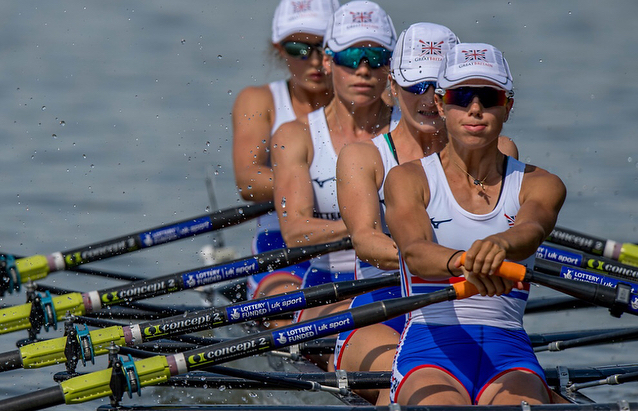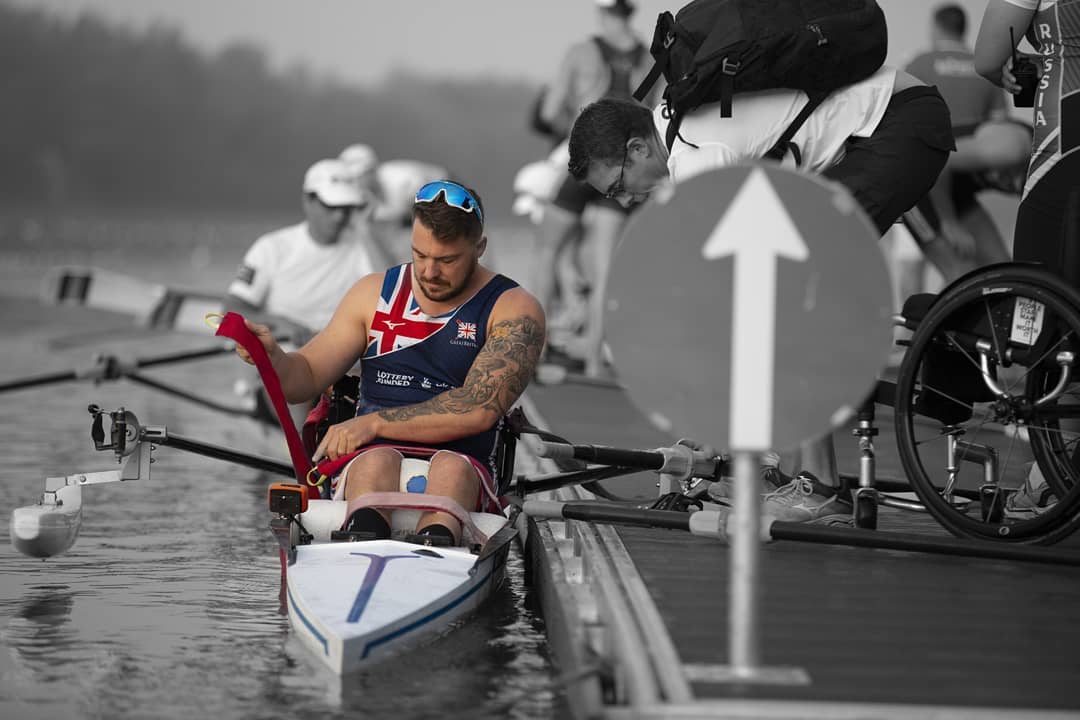Coronavirus has pushed International Rowers to train at home, but what does it mean for their fitness and future for next year’s Tokyo Olympics?
Benjamin Pritchard, former triathlete and cyclist qualified for the Tokyo Olympics after winning his first semi-final at the Rowing World Championships at Linz. The Welshman took up rowing after a freak cycling accident that left him paralysed and made it his passion, training tirelessly to finally compete in the Paralympics, but nothing could have prepared him and other rowers for a pandemic that postponed the Olympics and restrict training.
For these Olympic rowers, training doesn’t come easy, especially with the number of hours and days they invest in building a body fit to glide seamlessly through competitive waters. For Pritchard rowing gave a new meaning to life, making his wheelchair physically disappear for him when he was on the water. But, reaching the Olympics is fruition after hours of extensive training and painstaking bodybuilding.
Before the lockdown, Pritchard normally trained on average two times a day, six days of the week where it lasted between three to four hours. The training centre at British Rowing gave him access to boats allowing one water rowing session per day. Once restrictions were imposed, training moved indoors leaving him with minimal access to equipment and made rowing in the water obsolete.
“My training has taken a step back and I only row once a day and do weights once a day. The volume has come further back,” says Pritchard. But, this step back is considered as an advantage for some in the rowing world, giving them time to prepare themselves and maintain their fitness.

“Initially I thought it was going to be a setback, but the more I think about it, having another year of experience and training under my belt is probably a good thing, “says Pritchard. Despite the postponement of the Tokyo Olympic games, rowers are encouraged to minimize extensive training by their coaches, allowing them to be flexible and in control of their fitness.
“Our coaches are being very inventive. Every week we have a different challenge. We have done the three peaks, we have climbed the Everest and also done the pyramid session. It’s quite cool and it has kept us interested in normal training,” says Pritchard. Coronavirus has made a huge impact on the seasonal plan and championships urging international rowers to find new perspective and motivation for another year of Olympic preparation.
“The main problem for the high-performance athletes is the abrupt lack of international competition and the postponement of the Olympic games. As a result of this, coaching at the moment means helping the athletes to adapt to the situation,” says Robert Sans, coach for the Austrian Rowing Federation.

Niki Van Sprang, Dutch national team rower won the World Rowing Championship in double sculls in the semi-final B-class in Linz in 2019, almost qualifying to the Tokyo Olympics. His chances for redemption to qualify again in a different boat class took a turn due to the COVID outbreak. Niki started rowing at 2009 and ended up doing it fulltime, doing 12 sessions a week, extensively training for the championships.
In the Netherlands, rowers were allowed to row until April before complete lockdown after which training facilities shutdown. However, the rules are more relaxed allowing rowers to still train in water. “The boats weren’t part of the training centre, so we are still on normal training schedules,” says Niki as his team continued to work hard before they were hit with the official announcement.
On a Saturday at 10 pm the press announced that the Qualification Regatta would be cancelled. Niki was in a more precarious position with his teammate as he was supposed to go through another round of rowing to qualify for the Olympics. A week later the games were cancelled, leaving him to change the way he trained and do what he could from home to requalify again next year.
The support for Dutch rowers is huge in contrast to Wales where the clubs worked with qualified rowers to provide training equipment.” We all got rowing machines at home, while some got indoor spinning bikes and weights” says Niki. The rowers can train at home while others cycled to make up for training. Despite lockdown measure being relaxed rowers like Niki still can’t train like they normally do.
“If we run our normal training routine in the water now, no one will mentally make it to next year,” says Niki. A year with only extensive training and no racing meant that all their efforts will go to waste as the championships for this year have either been postponed or cancelled. This period is easier for rowers according to Niki as they have time to prepare and adapt.
The relaxed training, however, has dents that prove to be difficult for rowers. It is easy for them to maintain basic fitness while biking, but lifting weights posed different problems. “You cannot lift 150 kilos at home without a spotter. Weight lifting is still far from optimal,” says Niki. Rowers are slowly adapting to other fitness level developments which luckily have alternative ways to approach training.
Postponement of the Tokyo Olympics has not been easy for athletes all around the world, where some are going to benefit from it, while it’s difficult for others. Niki expresses that rowers in the Netherlands are relatively lucky given the circumstances and have time to focus on what they are meant to achieve.
Rowing is considered as a prestigious sport as the popularity is smaller in comparison to other major sports. But, the competition is fierce and the training is harder than what people perceive. “The motivation is different. We’re on a higher spectrum of training. It’s highly physical and technical, “says Niki. His need for speed and the feeling of syncing with his teammate on the water while rowing is something that drives Niki to aim for the championship under lockdown.

Philip Doyle is an Irish rower qualified for the Tokyo Olympics only to leave his hopes hanging after the championship was postponed to 23 July next year. Doyle currently trains every morning and evening, with some days having two sessions in the evening that coincide with his work schedule. However, he trains less in comparison to the hours that went into training before lockdown.
All training is restricted to rowing machines as all the waterways have been shut down after restrictions were imposed. Unlike the Netherlands, rules are much stronger in place in Ireland keeping training indoors even for professional athletes like Doyle. But, the gap in the training period and postponement of the Olympics has given new rowers a chance to excel and improve themselves during lockdown according to Doyle.
“So far we have been on an upward trajectory with our physiology. We are improving every season and thresholds have increased. So I think with another year that will suit us more to develop our skillset” says Doyle. The difficulty of not rowing with his teammate is not a concern for him as they are coached together with the same technique, training with that feeling and intensity in mind.

Rowers can communicate with each other during the lockdown which also keeps them mentally strong and positive about the unprecedented circumstances. Despite being tied down to training, they still find ways to make their quarantined time enjoyable and motivating by challenging each other and beating world records on their rowing machines.
“Everyone is stuck indoors, so all of the records are being broken. It’s very impressive. I set a world record earlier in the year, but that’s been broken twice by other people in my category already because everyone is doing a lot of erging,” says Imogen Grant, British rower who took up rowing at her College Boat Club at Cambridge University and went on to win a gold medal in the World Championship in 2019.
Professional rowers are lucky enough to get equipment from different places enabling them to train effectively. But, it’s not the same for club rowers who don’t have access to the equipment. The gap between these athletes also shows in the kind of support they receive from their respective clubs. However, smaller efforts such as setting up apps and getting access to coaches are being made to help lower tier rowers to train.

“It’s only a club level but fitness is important to people’s mental health. I have seen great initiatives with lots of different rowing clubs forming Strava, competing and supporting with each other through training, “says Grant explaining the app that is set up at no cost keeping rowers in the loop on each other’s performance.
International rowers are focusing on maintaining their fitness levels before lockdown during this time without trying to gain extra muscle or push on. So when they can return to full-time training, they can pick where they left off allowing them to reach the personal achievements in time for next year’s Olympics.
“Wales is still in lockdown and still a step behind the English government. So I’m not going to be in the water for a long time. We’re just going to have to keep going on and keep dreaming that one day we’ll be back on the water,” says Pritchard.
